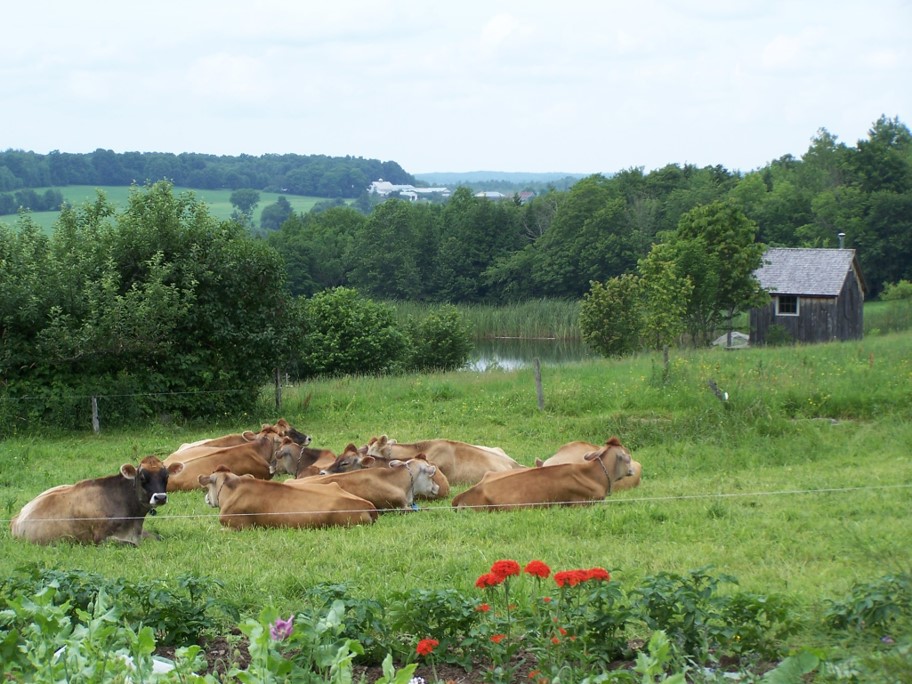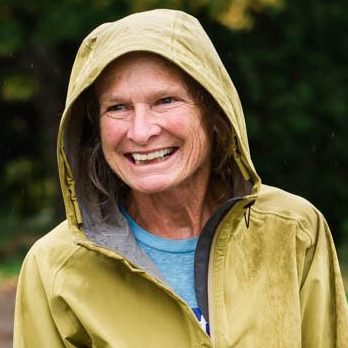Julie Wolcott farms organically on Green Wind Farm with her partner Stephen MacCausland and family in Fairfield, Vermont, where they also produce and sell maple syrup. In 2019, after 40 years of milking cows, Green Wind Farm transferred ownership of its Jersey cattle and contract with Stonyfield Farm to a new family of farmers, who are carrying on the organic tradition on the same land.
This Member Profile appears in the Winter/Spring 2020 issue of the Vermont Environmental Report. Read the full issue here.
Why are you a member of VNRC?
There are so many reasons. VNRC is a state-wide organization with a veteran staff working on collaborative solutions to existing and potential environmental issues. Your programs are focused but overlapping and comprehensive. I trust VNRC to speak out and up for policies, rules and legislation that protect all of Vermont’s natural resources and promote healthy communities of people, animal life, forests, and waterways.
How does your role as an organic farmer inform your views on climate change?
Being farmers, weather influences our plans every day, sometimes down to the minute. The extreme weather is challenging, from strong winds, to heavy rains, to extended dry periods, to variable winters. Cropping windows are narrow. Animal health is compromised with fluctuating temperatures. But the standards for organic farms are a climate change resilience playbook.
Green Wind Farm has maintained organic certification for crops, ruminant livestock, and maple syrup. Maple syrup standards require a forest management plan, a diverse species, trail and road maintenance to prevent erosion, and tapping standards to promote tree health to maintain the canopy. Livestock standards include a pasture rule requiring enough grazable forage to make up 30% dry matter in a cow’s diet plus requiring at least 120 days of grazing. Our farm is all in grass so there is no exposed soil. The soil’s capacity to withstand extreme weather events has increased over time.

Regenerative agriculture is a term we’re hearing a lot lately as a way to make our land more resilient in the face of climate change. How does it work?
Regenerative agriculture is an approach to farming that is applicable to all types of farms: conventional, organic and biodynamic. Soil health is put on a pedestal and all land management decisions, from cropping to animal and human uses, are decided through a “bettering soil health” lens. Improved soil does not sequester much carbon but it does allow for more water absorption and more biodiversity in soil life and the forages grown.
Unfortunately, in Vermont the term “regenerative agriculture” has been associated with the organization Regeneration Vermont, which has sharply divided the agricultural community by emphasizing the negative aspects of certain types of farming. As farmers, we need to work together to solve our problems, and speak with one voice to rebuild the farming communities in Vermont.
Where do you find hope and inspiration around preparing Vermont for a better future?
I’ll answer this from a farming perspective. There is a next generation that is eager to farm. Even though, as far as dairy is concerned, there are fewer farms, the same amount of land is still being farmed.
I am hopeful that the farm/land owners will work with aspiring farmers with a commitment to increasing the number of farms and farm families. This could be by sharing equipment, infrastructure, land, animals, time, and knowledge. Vermont also has a slew of dedicated technical advisors in the Vermont Farm & Forest Viability Program, at UVM extension, and at nonprofits (Land for Good, for example).
There is also financial support available through state initiatives that are eager to assist existing and beginning farmers. These include the Working Lands Enterprise Initiative; the Agency of Agriculture, Food and Markets; and federal cost sharing through the Natural Resources Conservation Service (NRCS).
Do you have any advice for aspiring organic farmers?
Work for and with a respected farmer for a few years. Come to understand the systems that work and systems that don’t for the land base and infrastructure. Start small, confirm your market, invest in what will provide you income (for instance, cows instead of equipment). Be ready for a 5-10 year slog. Be ready for work, sacrifice, and reward.
Find the full issue of the Winter/Spring 2020 Vermont Environmental Report here.
Photo of Julie Wolcott courtesy of Stonyfield Farm




